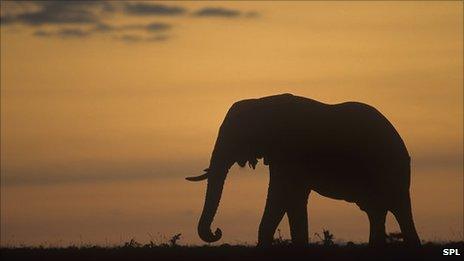Conservation groups barred from ivory meeting
- Published

The ivory trade is still big business
Conservation groups have criticised a decision to bar them from a high-level international meeting on elephant conservation.
The meeting of the Standing Committee of CITES, the international conservation agreement, was due to discuss elephant management.
This would include debate on poaching, conservation and illegal ivory trading.
CITES can impose bans or restrictions on trade for species that are threatened or in danger of extinction.
The unusual move on Wednesday to bar these organisations from all discussions relating to elephants and ivory was proposed by the Kuwait delegate representing Asia.
It was supported by Botswana, Colombia, Costa Rica, Dominica, Iran, Kuwait and Norway.
Shereefa Al-Salem, the Kuwait delegate, confirmed to BBC News that she had requested the closed session on the grounds that sensitive information was to be provided by some parties. She stressed, however, that Kuwait, as representative of the Asia region, was required to represent the majority opinion of the region.
Campaigners say the major consumer markets for illegal ivory - as well as rhino horn and tiger products - are located in Asia, particularly in China, Vietnam and Thailand.
The precise motivations for tabling the motion are unclear, but the committee was due to discuss the role of a number of Asian countries in combating the illegal ivory trade.
IFAW said that all discussion documents had previously been posted to the CITES website. Some of these were critical of enforcement efforts by parties to an international action plan to control the trade of elephant ivory.
Peter Pueschel, from the International Fund for Animal Welfare (IFAW), who was one of those asked to leave the meeting, said he could not "think of a bigger threat right now than a secret, closed-door meeting" on the matter.
'Transparency' issue
The 16 nations attending the meeting in Geneva, Switzerland, represent the larger group of 175 countries that are members of CITES (the Convention in International Species of Wild Fauna and Flora).
The multilateral CITES treaty was drafted in response to a resolution adopted in 1963 by the International Conservation Union (IUCN). But some have criticised the convention for not standing up to groups with commercial interests.
The decision to bar non-governmental organisations (NGOs) was reversed later the same day after a change of heart from the Norway delegation prompted another vote, with several nations then abstaining.
The motion was opposed by the British delegate representing Europe, Trevor Salmon of the Department for Environment, Food and Rural Affairs (DEFRA), according to a spokesman for the UK government agency.
The UK delegation reportedly spoke out strongly in favour of allowing the NGOs to remain on the grounds of transparency.
Heather Sohl, senior species officer from WWF-UK, said: "This is pretty exceptional, this hasn't happened for at least 10 years.
"It took most of us by surprise. It's something that shouldn't be happening. We know that politics does come into it and people use different tactics in order to achieve their outcomes but this really is something that nobody thought would actually go through."
Ivory market
Ms Sohl noted that the Standing Committee was due to discuss the role of Thailand and China in combating the illegal ivory trade. For example, it may decide to enforce deadlines for Thailand to improve its domestic ivory markets.
"That's something we would like to have a voice on. To raise concerns and questions and to take part in developing the measures that are going to tackle that trade. We do play a role in the implementation of these measures," added Ms Sohl.
A number of the NGOs who were excluded, such as WWF, provide both technical and financial support to CITES.
According to IFAW, the European Commission representative was also asked to leave but this was rescinded at the request of the UK government. A spokesperson for the Commission told BBC News that because the exclusion had been revoked, it was no longer an issue.
Despite the eventual reversal of the decision, there is now concern that the same could happen with the debates on rhino, Asian tigers and big-leaf mahogany.
The UK government has submitted proposals to the CITES meeting for all countries to clamp down on illegal sales of rhino horn. On Monday, the Natural Environment Minister Richard Benyon said: "We need to act now if we want the rhino to survive, and we need a global effort to ensure the strongest possible restrictions are placed on this archaic, cruel and completely unnecessary trade."
"It could be that another country asks for a closed session over rhinos and tigers and mahogany and it would go for a vote and it would all happen again," warned Ms Sohl, "we're hoping that we'll all be able to remain in the rest of the meeting."
The 61st meeting of the Standing Committee of CITES runs until the 19 August in Geneva.